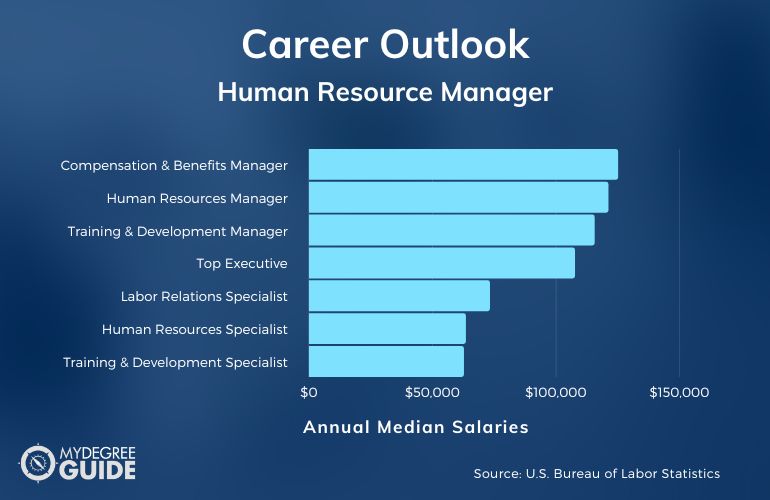Learning how to become a human resources manager can set you on a fulfilling career path. This job can be a great choice if you enjoy the business world and value helping others succeed in the workplace.

Editorial Listing ShortCode:
Becoming an HR manager takes time, but it’s worth the effort. On average, HR managers make $121,220 per year (Bureau of Labor Statistics).
What Degree Do You Need for Human Resources?
To get started in the HR field, it’s a good idea to earn a traditional or online bachelor’s degree in human resources either with a Bachelor of Business Administration with a concentration in HR or a Bachelor of Science in Human Resources Management.
Bachelor of Business Administration – Human Resources

Many human resource professionals use their skills in corporate settings. For that reason, it may make sense for you to get a business degree.
In a Bachelor of Business Administration program, you’ll most likely take a core of business courses and then round out your program with a concentration in human resources.
The core business curriculum can include courses on accounting, marketing, and business law. You can also gain management skills and discuss business ethics.
Your HR degree concentration may consist of four or five specialized classes. HR studies typically include information on pay and benefits, hiring processes, employee development, and conflict resolution.
This degree is a particularly good choice if you want to do HR management or be a training and development specialist in a corporate setting. Plus, it can help you acquire business skills that can transfer to related disciplines like marketing or finance.
Bachelor of Science in Human Resources Management

Human resources skills are valuable in all sorts of organizations. Nonprofits, schools, and hospitals need HR pros just as much as corporations do. For in-depth HR knowledge that you can rely on in any work setting, consider earning a Bachelor of Science in Human Resources Management.
The majority of the courses for your major should focus specifically on human resources. You can expect to study employment law and become well-versed on topics like minimum wage and benefits packages.
The courses can help you learn how to hire talented people, develop their skills, and persuade them to stay with your organization. You can learn to negotiate with union representatives and settle disputes among employees.
This degree can help open the doors to an HR position in nearly any field. This includes government agencies, small businesses, nonprofit organizations, and major corporations.
Common Courses for Human Resources MBA Programs

Whether you opt for a BBA in Human Resources or a BS in Human Resources, you will take multiple classes focused on HR topics. The curriculum may include courses like the ones listed below.
- The compensation package course covers topics like salaries, hourly wages, and benefits packages. The curriculum may address the concept of total rewards, which encompasses both tangible and intangible benefits of working for a particular employer.
- Conflict management can help you learn to identify healthy and dysfunctional office cultures and develop skills for settling interpersonal conflicts between employees. To gain insight from real-world examples, you may read case studies.
- Employee development typically begins with an introduction to learning theories and the science of motivation. Then, you’ll discuss using those principles to help employees improve their workplace skills.
- Foundations of human resources management is an introductory course where you can get an overview of the HR field. Higher-level classes often build upon the concepts learned in this class.
- Hiring and retention is an important course as you study hiring practices. It can prepare you to sort through resumes and choose candidates to interview. It can also train to seek out top talent and recruit those people for your organization. This class may also teach you methods of keeping good employees around long-term.
- Labor relations discusses the history of labor unions and their modern structure as well as the laws that govern them. You are likely to discuss the implications of unionization for your HR practices and learn to carry out negotiations.
You may have the opportunity to take a handful of electives, such as business or psychology classes. These courses can provide valuable insight into working with people in an office setting. Another option may be to take courses related to HR practices in a particular industry, such as healthcare.
How Hard Is It to Become an HR Manager?

If you are interested in becoming an HR manager and rising to the top of your field, you’ve got your work cut out for you. Fortunately, it’s entirely doable. You just have to be willing to put in the time and effort.
Landing a management position in HR will require that you first get a bachelor’s degree and take entry-level jobs in the field.
Over time, you’ll gain experience and may choose to earn industry certifications or a master’s degree in the field. Eventually, you’ll be ready to apply for human resources management positions, which makes getting a master’s in human resources worth it.
How Can I Be a Good HR Manager?

If you want to succeed in an HR role, start by working on your ability to show caring and compassion for others. Employees will be more willing to respond to your initiatives if they believe that you care about them, and you’ll have better luck understanding workplace dynamics.
Of course, you must also be firm and able to separate your personal feelings from the facts in tricky situations. If you can find the right balance between compassionate caring and objective authority, you’ll be well on your way to success in this field.
Human Resources Qualifications and Skills
Success in the HR field requires certain strengths and skills. Developing those can help you garner respect and advance to increasingly higher positions of authority.
- Clear communication is important as you must know how to speak or write in a way that gets your message across
- Confidentiality is the understanding the importance of discretion and knowing when to speak up about a matter and when to stay quiet
- Decisiveness means having the confidence to weigh options and make a decision that will affect others
- Personal compassion shows that you care and have concern for others
- Objectivity is being able to see the big picture and make choices based on facts not feelings
- Organization is vital to keep details and files in order
- Team leadership includes having the skills to manage a group of employees and cast a vision
- Versatility is knowing how to switch from one task or responsibility to another on a regular basis
You may possess some of these skills already, but you don’t have to be natural at all of them to become a great human resources manager. Through education and effort, you can work on strengthening your HR qualifications.
What Do You Do as a Human Resources Manager?

HR positions are available in both large and small companies. Nonprofits, government agencies, schools, and healthcare organizations may also need your services.
In any setting, a human resources manager usually handles a wide variety of tasks every day. It will be important that you know how to shift gears frequently.
You may play a role in talent recruitment, such as identifying potential new hires to pursue or reviewing resumes.
This responsibility may also include conducting interviews, having a say in the final hiring decision, and carrying out the sign-on process.
Employee development and retention may fall on your shoulders as well. You may work on developing initiatives that can help team members get better at their jobs.
To keep employees happy, you may be in charge of crafting attractive compensation packages or developing a positive workplace culture.
Negotiations and conflict resolution may be other tasks that you handle. You may need to settle disputes between team members or resolve issues between employees and management. Handling talks with labor representatives may be involved as well.
In some situations, you may be responsible for just one aspect of HR. For example, compensation managers deal only with the administration of wages and benefits.
Human Resource Manager Salary

Once you know how to become a human resource specialist, it’s important to understand what you can do with this degree and how much you’ll earn. To find your niche in the HR field, take a look at the following career paths you can explore, according to the Bureau of Labor Statistics.
| Careers | Annual Median Salaries |
| Compensation and Benefits Manager | $125,130 |
| Human Resources Manager | $121,220 |
| Training and Development Manager | $115,640 |
| Top Executive | $107,680 |
| Labor Relations Specialist | $73,240 |
| Human Resources Specialist | $63,490 |
| Training and Development Specialist | $62,700 |
| Human Resources Assistant | $43,250 |
You should expect to get started in an assistant or specialist position. With experience, you can work your way up toward a management role.
Professional Organizations for Those with an HR Degree

To improve your skills in human resources and increase your chances of becoming management material, it’s a good idea to join an industry organization. Membership in a professional association can help you get to know other people with similar jobs.
You can learn from their experiences and swap ideas with them. In addition to meeting people, you may also have access to other informative resources like online training sessions or members-only publications.
- Academy of Human Resource Development (AHRD) focuses on the academic aspects of the human resources field. As a member, you’ll be able to read online journals and newsletters, and you’ll get to participate in special interest groups.
- Association for Talent Development (ATD) provides resources to help you in your training and development role. Joining the group allows access to webinars, e-books, reports, and magazines.
- HR People + Strategy (HRPS) is the Executive Network of the Society for Human Resource Management. Membership is for senior-level executives and offers benefits like research papers and quarterly journals.
- International Association for Human Resource Information Management (IHRIM) deals with the technology side of HR work. When you become a member, you can access webinars and recordings of past conferences, and you can peruse a job board.
- National Human Resources Association (NHRA) caters to a wide mix of HR professionals. You’ll be able to attend meetings, participate in online programs, and view job listings.
- Society for Human Resource Management (SHRM) has more than 300,000 HR members. The group’s benefits include news alerts, sample forms, a magazine subscription, and access to a consultation service.
Joining a professional organization may grant you discounts on professional resources as well. Some groups give members reduced rates for training or conferences.
Certification and Licensure Following an MBA in Human Resources

You can demonstrate your proficiency in human resources by obtaining professional certifications.
- Professional of Human Resources (PHR) is a credential from the HR Certification Institute (HRCI) for mid-level HR specialists. To qualify, you’ll need to understand U.S. employment laws and have experience with running HR programs.
- Senior Certified Professional (SHRM-SCP) certification is for HR professionals in management and similar leadership roles. Holding this credential demonstrates that you have a keen understanding of how HR efforts can contribute to an organization’s success.
- The Senior Professional in Human Resources (SPHR) is a credential issued by HRCI, and is geared toward upper-level HR professionals. Having this certification shows that you are capable of crafting effective HR plans and programs and that you grasp the strategic influence that HR departments can have.
- The Senior Professional in Human Resources — International (SPHRi) is for you if you have a leadership role in an HR department outside of the U.S. rather than the SPHR. The international program removes any references to U.S. laws and standards and instead focuses on human resources principles that apply worldwide.
Earning a certification usually involves passing an exam, so you’ll need to set aside time to study and prepare. Also, you may need to earn a set amount of professional experience before you’ll qualify.
How to Become a Human Resources Manager

You have your sights sets on human resources management. The following steps provide a roadmap for achieving that dream.
- Earn a human resources bachelor’s degree
- Complete an internship, or begin with entry-level HR positions
- Increase your qualifications with certifications or a master’s program
- Advance into HR management roles
If you’re ready to take the first step on the path to becoming a human resources manager, start by applying to university HR bachelor’s programs.
